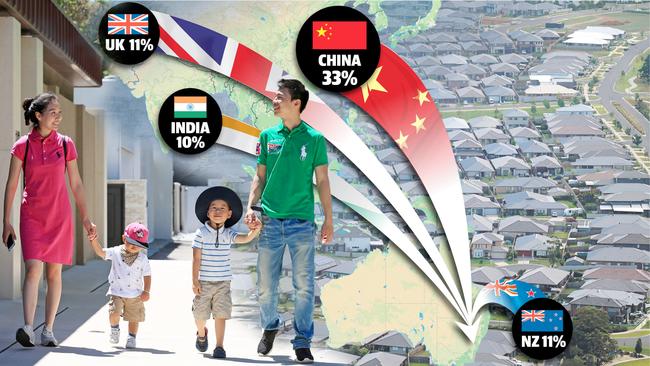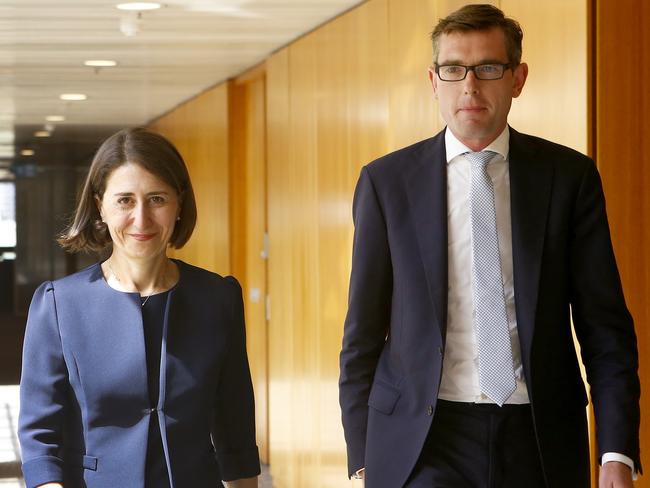Housing affordability crisis: Stamp duty no help for NSW buyers, says Gladys Berejiklian
GLADYS Berejiklian has revealed the government’s stamp duty surcharge on overseas buyers would not ease the housing affordability crisis for local buyers.
NSW
Don't miss out on the headlines from NSW. Followed categories will be added to My News.
AS Australians continue to be squeezed out of the NSW property market by cashed-up foreign buyers, Premier Gladys Berejiklian has revealed the government’s stamp duty surcharge on overseas buyers is purely about “raising revenue” and would not ease the housing affordability crisis for local home buyers.
She also confirmed the government was looking to increase the 4 per cent charge in the June budget.
Her comments come as NSW Treasurer Dominic Perrottet’s office said large numbers of foreign property buyers were able to avoid paying the surcharge.
Office of State Revenue figures show 11 per cent of property buyers in NSW are foreign nationals, and yet only 1.5 per cent of them are paying the extra tax.
Ms Berejiklian yesterday said many foreign buyers were permanent residents — but the OSR’s own data shows that 4.5 per cent of people who bought homes in NSW between July and September 2016 were non-residents for tax purposes.

Under the stamp duty system, those people who can prove they have been in Australia for 200 days out of the past year do not have to pay the 4 per cent surcharge.
A foreign buyer of property must also prove, at least according to the legislation, that they are “ordinarily resident in Australia ... and is not (or was not, immediately before their most recent departure from Australia) subject to any limitation as to time for their continued presence in Australia”.
The inconsistency in the figures raises serious questions as to whether the surcharge is properly targeting all foreign buyers.
Victoria recently raised its surcharge on foreign buyers from 4 per cent to 7 per cent, and NSW Labor leader Luke Foley has promised to do the same here if elected.

Shadow Treasurer Ryan Park said yesterday: “If we have to crack down on the eligibility rules then we will.
“We will put local families who want to get a foot on the property ladder ahead of overseas investors who are just parking their money in property and keeping locals out of the market.”
Ms Berejiklian, who said when she became premier that her number one issue in government was housing affordability, yesterday said the surcharge would not help alleviate the crisis.
“This policy is great for revenue raising but it doesn’t provide a fairer playing field for those trying to get into the market for the first time,” she said. “I have to say, that is not the solution to affordability.
“People who say it is are not really astute enough around these issues. Unlike other state governments, who said when they introduced it they thought it was going to make it more affordable for people (to buy a home) — well, no.
“We didn’t introduce it because it affects affordability — it’s because it was an extra revenue raiser for the state.

“Foreign people who purchase property can afford to pay the surcharge. We did it as a revenue raiser. It’s good for raising money for the state government.
“But you need to address a whole range of different issues if you really want to tackle housing affordability.”
Asked if she was considering raising the surcharge, the Premier said: “We are, we are — because it’s a good revenue raiser.”

Ms Berejiklian did not rule out the prospect of putting extra cash raised from increasing the foreign investor surcharge into helping first-home buyers.
“We are looking at those opportunities. We are looking at opportunities in relation to the surcharge in the future,” she said.
The government is expected to unveil a package of measures tackling the housing affordability crisis closer to the June budget, also potentially including allowing first-time buyers to defer stamp duty payments. The tax on buying a property is raking in $9 billion a year for the state government.
Mr Perrottet also said he would consider a vacant property tax, similar to one in Victoria, amid fears foreign investors are buying property purely as an investment and leaving it vacant.



